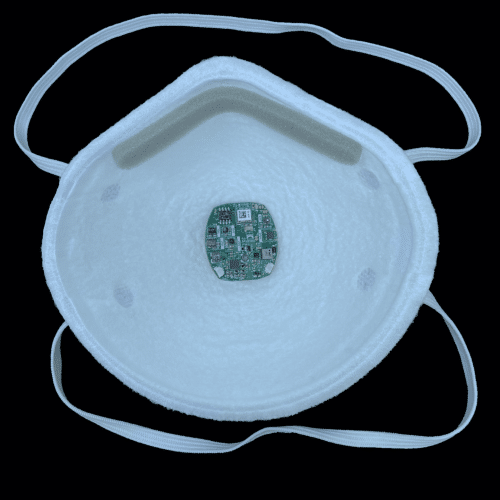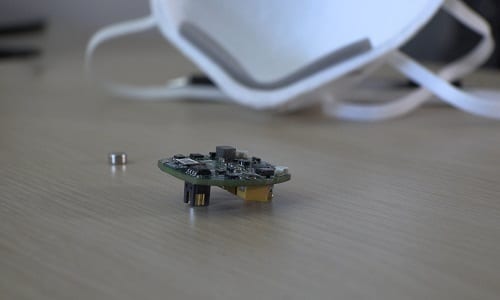The sensor in a face mask can monitor the wearer’s, especially a health care professional’s physical and emotional health
Medical workers including doctors and nurses often have to wear face masks for prolonged periods when attending to patients. Not only does it prevent them from any viral infections that a patient might carry, but also helps keep the hospital environment sterile.
But when working for extended hours with a face mask wrapped around the nose and mouth, the face can become numb. Any sudden deterioration in health could prove costly, both for the medical practitioner’s and the patient’s life.
So what should be done? A face mask is made of fabric and not electronics that can monitor health in real-time. Is an electronic face mask possible? Well, sort of.
JOIN HERE 👇👇To get more updates
A team of engineers at Northwestern University has developed a new smart sensor that can fit into face masks for measuring the user’s real-time respiration rate, heart rate and mask wear time. Dubbed as “FaceBit”, this “Fitbit for the face” is a lightweight, small-sized sensor that uses a tiny magnet to attach to any N95, cloth or surgical face mask.
“We wanted to design an intelligent face mask for health care professionals that do not need to be inconveniently plugged in during the middle of a shift,” said Josiah Hester, Assistant Professor of Computer Science, Electrical and Computer Engineering at the McCormick School of Engineering and Applied Science, Northwestern University.

The sensor is powered by a tiny battery that harvests energy from its surroundings including the force and heat generated by a user’s respiration as well as from the sun. This allows the FaceBit to last longer than 11 days between charges.
JOIN HERE 👇👇To get more updates
Upon gathering various physiological signals such as heart and respiratory rates, the sensor wirelessly transmits all this information to a dedicated smartphone app and immediately alerts the user whenever an unexpected risk concerning elevated heart rate, fatigue and vulnerable emotional health arises.
According to Hester, a person’s head marginally moves every time a heartbeat occurs. FaceBit can sense that subtle motion and differentiate it from other motions to calculate heart rate.
“Your heart is pushing a lot of blood through the body, and the ballistic force is quite strong,” said Josiah Hester said. “We were able to sense that force as the blood travels up a major artery to the face.”
Because stressful events can elicit physiological responses, including rapid breathing, FaceBit can use that information to alert the user to take a break, go for a walk or take deep breaths to calm down. Hospital systems also could use this data to optimise shift and break schedules for their workers. And because heart rate and respiration rate are tightly interconnected, the ability to monitor both could open new research possibilities.
JOIN HERE 👇👇To get more updates
At the same time, FaceBit ensures that the N95 mask properly covers the face of a health care worker and there is no gap. If the mask becomes loose throughout the day or a bump is detected during an activity, then FaceBit alerts the wearer.
“FaceBit provides the first step toward practical on-face sensing and inference, and provides a sustainable, convenient, comfortable option for general health monitoring for COVID-19 frontline workers and beyond,” said Josiah Hester. “I’m really excited to hand this off to the research community to see what they can do with it.”
Thanks to its unique method of harnessing energy from the wearer’s breathing, FaceBit’s battery-free technology is sustainable and has a long life. The team in the future hopes to incorporate a technology that can harness thermal and kinetic energy to solely power the device.
For FaceBit to successfully pass clinical trials and validation, the project has been released as open-source and open hardware so others can improve any shortcomings.
Read here for more
For more latest updates on jobs, internships & projects, visit our website regularly, and don’t forget to join our social media groups.
| Join Our Telegram Channel | Click Here |
| Join Our Whatsapp Group | Click Here |
| Follow us on LinkedIn | Click Here |
| Follow us on Facebook | Click Here |
| Follow us on Instagram | Click Here |








